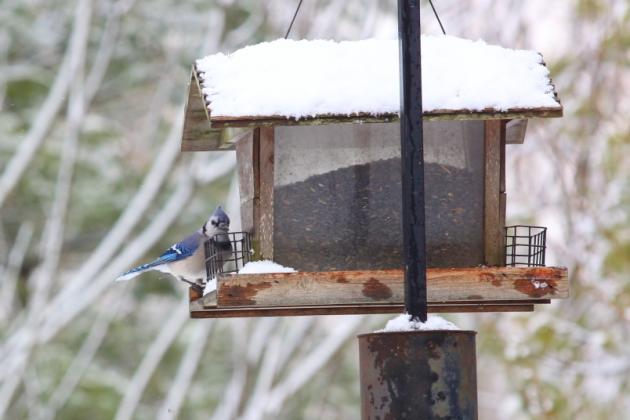Recent testing confirmed disease presence in deceased songbirds
FRANKFORT, Ky. (March 9, 2021) - Kentuckians are encouraged to pay special attention to their backyard bird feeders after recent tests found salmonella in several deceased songbirds collected from Bullitt, Calloway and Washington counties.
In response to recent reports from the public, the Department of Fish and Wildlife Resources collected several deceased pine siskins from the counties and submitted them to the Southeastern Cooperative Wildlife Disease Studylab in Athens, Georgia. Tests confirmed the presence of salmonella in several of the birds.
“We are experiencing a higher than normal incidence of salmonella outbreaks at bird feeders this year,” said Dr. Christine Casey, state wildlife veterinarian for the Department of Fish and Wildlife Resources. “This has also been observed elsewhere in the United States. We would like to remind the public to clean feeders regularly to avoid spreading salmonella and other germs. Cleaning feeders frequently is always important when feeding birds. Feeders should be cleaned at least every two weeks with a 5- to 10-percent bleach solution and rinsed to remove any of the solution.”
If you notice sick or dead birds by your feeder, Kentucky Fish and Wildlife recommends:
- Taking the feeder down immediately. Remove any remaining seed from the feeder. Clean and store the feeder for two weeks. A salmonella outbreak at a feeder most likely results from one or more infected birds visiting that feeder. The bacteria then spread at the feeding site through the droppings of infected birds. Removing the feeder stops the birds from gathering in common areas. Instructions on how to clean bird feeders can be found online at allaboutbirds.org/news/how-to-clean-your-bird-feeder/.
- When you put the feeders back up, try to put them in a different location, if possible, to avoid contaminated soil. Leftover seed still in the bag should be safe to use. Be sure to continue to clean feeders regularly. Watch for sick birds. If you see any, take the feeders down again.
“Bird feeding has grown in popularity over the past year with people spending more time at home during the pandemic,” said Kate Slankard, avian biologist for Kentucky Fish and Wildlife. “It’s important to be good stewards when feeding birds by giving them safe and clean feeding areas. Salmonella is probably present to some extent every year, but this year seems to be worse than usual for outbreaks with negative effects. All species of birds can be affected by salmonella, but some species are more susceptible to severe disease than others.”
Salmonella can be transmitted from animals to people. However, the risk of infection can be drastically reduced with good hygiene practices. Care should be taken to avoid contact with bird droppings when cleaning feeders. Wear gloves and wash your hands frequently. Additionally, immunocompromised individuals tend to be more susceptible to these infections and should avoid handling contaminated feeders.
If you discover multiple deceased birds at your feeder after implementing the above recommendations for decontaminating your feeders, please contact Kentucky Fish and Wildlife by phone at 1-800-858-1549 or by email at info.center@ky.gov.


